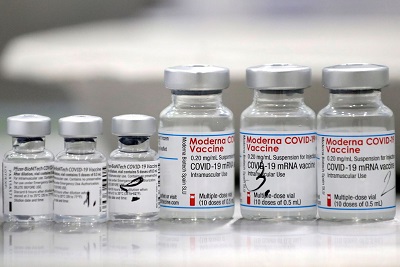
Efforts to develop an African base for COVID-19 vaccine production will focus on trying to replicate Moderna’s (MRNA.O) shot, but a lack of progress in talks with the U.S. company mean the project will take time, a senior WHO official told Reuters.
The drive to produce vaccines in Africa is designed to help more developing countries access COVID-19 shots after rich nations bought up most of this year’s supply.
Moderna said last October it would not enforce patents related to its shot during the pandemic, raising hopes that other companies might be able to copy it and help boost COVID-19 vaccine production.
In practice, though, it is hard to replicate a vaccine without the information on how it is made, and the World Health Organisation (WHO)-backed tech transfer hub in South Africa – set up in June to give poorer nations the know-how to produce COVID-19 vaccines – has so far not reached a deal with the company.
“The talks have not yielded any results,” Martin Friede, WHO Initiative for Vaccine Research Coordinator, told Reuters.
Moderna did not respond to a request for comment.
The case highlights the challenges faced by the WHO as it battles to expand vaccine production to help address the glaring inequalities between rich and poor nations in the pandemic.
More than three quarters of the 5.5 billion COVID-19 shots administered worldwide have gone to high and upper-middle income countries, which make up just over a third of the world’s population.
Currently only 3 per cent of Africa is vaccinated, the African Union’s top health official said last week, compared with more than half of the United States and three quarters of Spain.
Dr Friede said Moderna’s vaccine had been chosen as an abundance of public information and its pledge not to enforce patents made the shot slightly easier to copy than some rivals.
“We have to make a choice now. The deadline is upon us; time to start ordering chemicals. We’ve chosen Moderna,” he said.
But even if the hub manages without Moderna’s help, it could take more than a year to get a distributable vaccine as clinical trials would only begin in the latter half of 2022, he added. -Reuters






